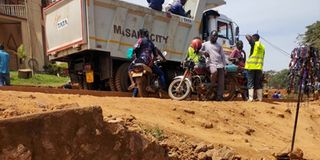Prime
Masaka City residents up in arms over garbage fees

Members of YAMAC collect garbage in Masaka City on January 29. PHOTO | MALIK FAHAD JJINGO
What you need to know:
- Masaka City generates at least 100 tonnes of garbage every week, but authorities can only collect 70 percent, leaving 30 percent of garbage uncollected.
A section of Masaka City residents have protested the fee levied by the authorities as they collect solid waste in the city.
Effective last month, authorities started charging between Shs500 and Shs1,000 per household depending on the volume of garbage generated.
But the residents claim the levy has not been approved by the city council, hence illegal.
Over the years, garbage trucks have been passing through the city at least thrice a week collecting garbage from residents but at no cost.
Ms Agnes Namusooke, a clothes dealer on Hobart Street in Masaka City, says she was surprised when members of Youth in Action Masaka City (YAMAC) last month asked her to pay garbage fees.
“City authorities have never engaged us about their plan to start levying money for garbage. What we know is that it is a responsibility of the city council to collect garbage because we pay taxes. Why are they adding another burden on us?” she wondered in an interview on Monday.
Mr Solomon Kintu, a trader on Kikuubo Lane, asked why members of YAMAC, who offered to help Masaka City Council to keep the city clean, have now resorted to charging money.
“The money being charged for garbage is receipted and we want the city authorities to come clean on this,” he said
However, Mr Muzeyi Male, one of the leaders of YAMAC, dismissed the claims that they charge garbage fees.
“We are having engagements with owners of restaurants and hotels that generate large volumes of garbage to pay a small fee to help to motivate the youth that are involved in garbage collection,” he noted.
Leaders speak out
He added: “We have not started charging money for garbage, but some individuals that appreciate the work the volunteers are doing, give them a small token of appreciation.”
Mr Monday Ssegawa, the chairperson of Katwe Ward, one of the areas where huge volumes of garbage are generated, said charging residents money for garbage will help instil discipline and curb littering the city.
“We have for long been stuck with this challenge of garbage but since the volunteers of YAMAC took charge, there has been a tremendous improvement in solid waste management. Let residents appreciate the work being done by those youth instead of focusing on the little money some people give them,” he said.
Masaka City Speaker Tonny Ssempijja said those collecting garbage fees are doing it illegally since the council is still developing a law to streamline solid waste management .
“Who set those rates they are charging? The law on solid waste is not yet in place and it is still Council’s responsibility to collect garbage without charging any money from city dwellers,” he said.
Five years ago, city authorities announced that they had embarked on identifying private firms to undertake solid waste management, which is one of the major problems affecting the recently created 10 cities across the country.
The decision to privatise solid waste management was reached following the failure by the city to effectively do the work due to low local revenue collections yet this component alone is costing them 46 percent of their total budget.
In 2019, three local private firms had applied to collect garbage in the city, but failed to make it through the bidding process. This prompted authorities to continue managing garbage collection as they look for competent firms to handle the task.
Masaka City generates at least 100 tonnes of garbage every week, but authorities can only collect 70 percent, leaving 30 percent of garbage uncollected.
Global outlook
While waste management is an everyday conversation in capitals of developed countries including making the best out of it like generating electricity, this is not the case in developing countries like Uganda. The World Bank in its September report, reinforced that rapid urbanisation and population growth create larger population centres, making the collection of all waste and land procuriement for treatment and disposal more and more difficult.
As a result, as countries develop from low-income to middle- and high-income levels, their waste management situations also need to “evolve” correspondingly. World Bank estimates show that Africa generates nearly 70 million tonnes of waste every year.



